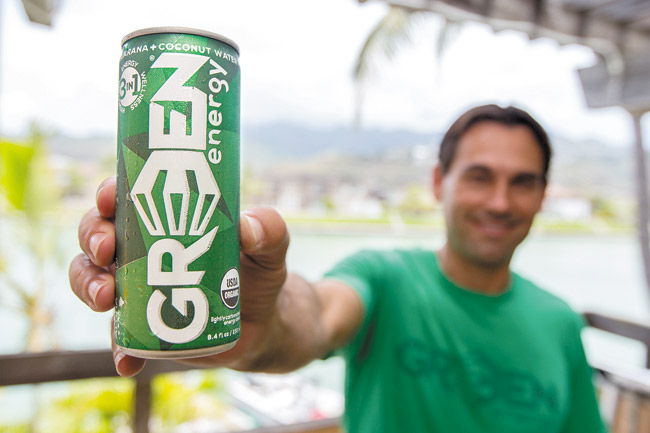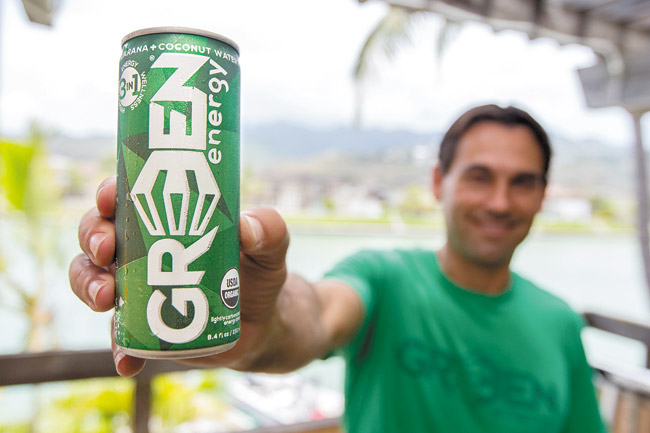Hawaii’s Own Energy Drink
A Honolulu entrepreneur creates a tasty concoction made with kale, coconut water, green tea and guarana that he says provides ‘an elevated state of awareness’
GR3EN energy is hard to miss. In a sea of energy drink brands, it isn’t only its bright green can that will catch the eye.
mw-nm-060414-alan-joaquin-ac-1
Take a closer look and there is one ingredient that instantly stands out: kale. Yes, that coarse, leafy vegetable that has become a commodity for those health-enthused eaters who have claimed it as the latest superfood.
It is an innovative venture and the first of its kind for any energy drink, but its founder and CEO Alan Joaquin is no newcomer to thinking outside the box.
In 2008, he founded Farm-Roof, an inventive method of rooftop farming. Though it met with a few “you’re crazy” comments, FarmRoof successfully installed its first certified organic rooftop farm at Sweet Home Waimanalo in 2011.
“One thing that we like to do is challenge the status quo,” he says.
Seeking to foster value-added crops, he began experimenting with various kale varieties before eventually deciding to pursue an energy drink.
“I saw an opportunity to come in with GR3EN energy that is made with organically sourced ingredients that are sustainably farmed,” he says.
Yes, kale
It is a hot, balmy day in Hawaii Kai where GR3EN energy’s “GR3EN house” is located.
As Joaquin — full disclosure: He is the husband of MidWeekcolumnist Tannya Joaquin — passes out chilled cans of GR3EN energy, it’s impossible for first-time tasters to know quite what to expect. Other than kale, the drink’s main ingredients include coconut water, guarana and green tea.
But at this point, anything to quench the thirst on a humid day is welcome.
The first sip is unusual, though not in a bad way. It’s an unexpectedly pleasant and flavorful encounter that tastes like coconut, but has you going for a second sip just to see if your taste buds will be able to detect any trace of kale. It is a reaction that took Joaquin approximately a year and a half to perfect.
The beverage addresses a three-in-one concept: energy that is obtained from guarana, green tea and cane sugar; hydration from coconut water; and wellness from kale, which is full of nutrients.
Unlike most energy drinks, there is no crash, and its effects are less harmful to those with sensitive stomachs. Its main purpose is as a functional beverage that allows its consumers to focus on tasks.
“It is an energy drink, but it’s a different type of energy drink,” he says. “We call it an elevated state of awareness.”
Currently, the drink is available at about 50 locations at stores such as Whole Foods and resorts including JW Marriott Ihilani Ko Olina Resort & Spa and Four Seasons Hotel and Resorts. Joaquin also recently loaded 12 cases of GR3EN energy onto Hokule’a for its worldwide voyage.
“That made us feel like we’re doing the right thing,” says Joaquin, “because they’re appreciating it enough to take it with them and use it to help power them through the voyage.”
From crop to can and back again
The success GR3EN energy has seen in such a short amount of time since its first cans arrived this year is really just a single brush stroke to a much larger picture Joaquin hopes to paint.
At the root of the company are three operating philosophies, represented most visibly in its logo. They are: people, planet, prosperity — meaning, of utmost importance, the company seeks to do right by the community and environment.
For Joaquin, GR3EN energy isn’t just a drink, it’s a lifestyle.
“Our tagline is ‘realize your superpowers,'” he explains, “and it’s all about energizing, educating and empowering people to be the best they could possibly be.”
Through future projects such as GR3EN TV, Joaquin hopes to highlight the “everyday” hero and popular sports that may not always receive coverage.
Beyond that, Joaquin seeks to strengthen the foundation for more rooftop gardens to develop and enhance what he calls the “green-collar workforce.”
With a long history of environmental work and protecting local resources, he created a nonprofit, Seed the Future. A portion of proceeds from all sales of GR3EN energy are donated to the organization, which he hopes will provide the means for more companies to install FarmRoof.
Seed the Future’s goal, he says, is “planting righteous seeds today so that we can reap prosperity tomorrow.”
Currently, some companies have resisted installing Farm-Roof because of the high cost. With Seed the Future, Joaquin hopes to work with businesses and hotels in particular, to provide funding through grants made possible by the organization. Eventually, he hopes it will facilitate roof-to-table concepts that may be implemented in cuisine and mixed with fresh juices and cocktails made with GR3EN energy.
“If I could fly into a city and look down and see a bunch of rooftop farms that I helped put in through Seed the Future, that’s the goal,” he says.
Oh, and if you’re still wondering if the flavor of kale is noticeable or whether the drink itself is green, well, you’ll just have to try it to find out.
For more information on GR3EN energy, visit gr3en.org.







